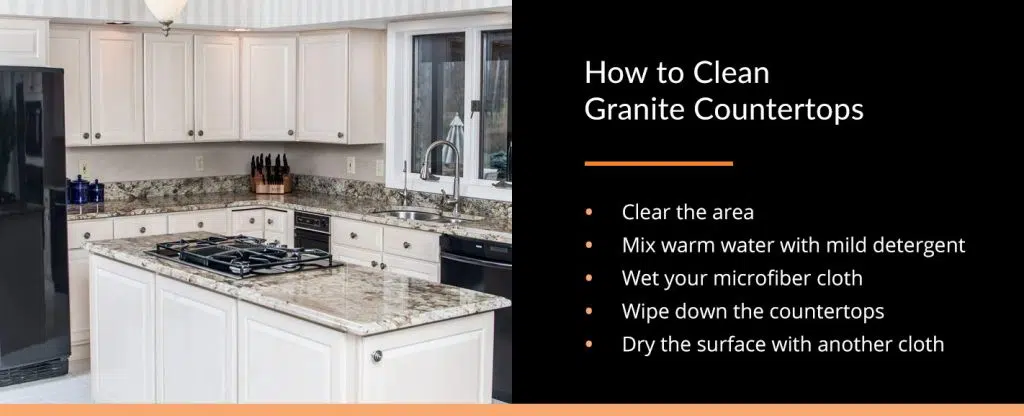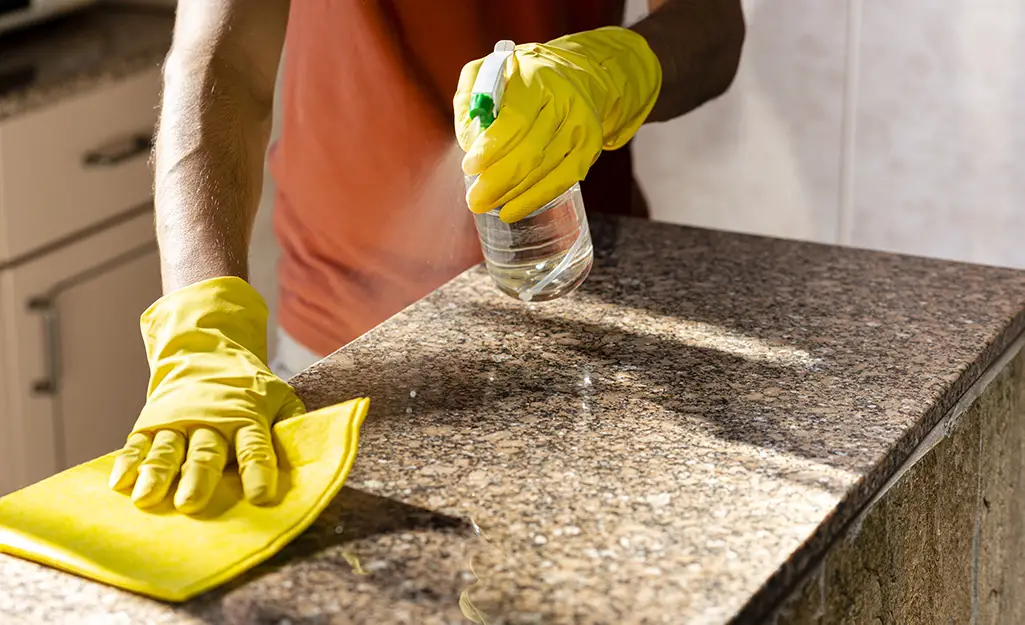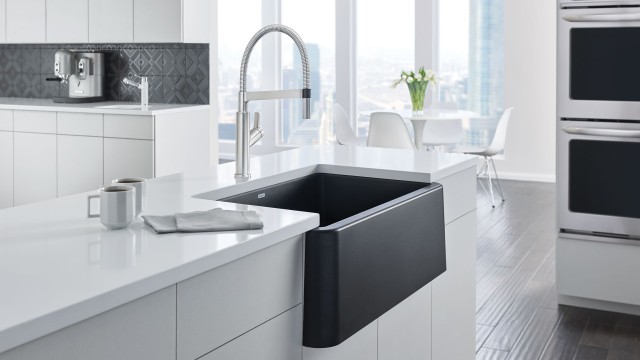How To Clean Kitchen Countertops Naturally
Keeping your kitchen countertops clean and sanitary is essential to maintaining a healthy and safe home. But many harsh chemical cleaners are not only expensive but can be dangerous for the environment and your health. Fortunately, there are several natural kitchen countertop cleaning solutions that can effectively clean and sanitize your countertops without the need for harsh chemicals. This article will provide tips on how to clean kitchen countertops naturally using items found in your home.

Overview of Kitchen Countertops
Cleaning
Kitchen countertops are one of the most heavily used surfaces in the home, and keeping them clean and germ-free is essential to maintaining a healthy living environment. Natural cleaning products are a great way to keep your countertops clean without using harsh chemicals. In this blog post, we’ll explore the different options for cleaning kitchen countertops naturally and discuss the benefits of using natural products. We’ll also look at some of the best natural cleaning products available on the market. Finally, we’ll provide some helpful tips for making sure your countertops stay clean and germ-free. Whether you’re looking for an effective and safe way to clean your countertops or just interested in learning more about natural cleaning products, this blog post will provide you with the information you need.
Natural Cleaning Supplies for Kitchen Countertops
Cleaning kitchen countertops naturally is a great way to reduce the use of harsh chemicals and keep your counters looking spotless. Natural cleaning supplies can be used to effectively remove dirt, grime, and bacteria from your kitchen countertop surface. There are several natural ingredients that can be used to clean kitchen countertops including baking soda, white vinegar, lemons, hydrogen peroxide, and olive oil.
Baking soda is a great natural cleaner for kitchen countertops. It can be used to remove grease, oil, and other deposits from your countertop surface. To use, simply sprinkle baking soda onto the countertop and scrub with a damp cloth. After scrubbing, rinse the surface with water and dry it with a clean cloth.
White vinegar is another effective natural cleaner for kitchen countertops. To use, mix one part white vinegar with two parts water in a spray bottle. Spray the solution on the countertop and wipe with a damp cloth. Rinse the surface with clean water and dry with a clean cloth.
Lemons are also effective for cleaning kitchen countertops. To use, cut a lemon in half and sprinkle the juice onto the countertop. Scrub with a clean cloth and rinse the surface with water.
Hydrogen peroxide can also be used to clean kitchen countertops. To use, mix one part hydrogen peroxide with one part water in a spray bottle. Spray the solution on the countertop and scrub with a damp cloth. After scrubbing, rinse the surface with water and dry it with a clean cloth.
Olive oil can be used as a natural cleaner for kitchen countertops. To use, mix one part olive oil with two parts water in a spray bottle. Spray the solution onto the countertop and wipe with a damp cloth. After wiping, rinse the surface with water and dry it with a clean cloth.
Using natural cleaning supplies to clean kitchen countertops is a great way to reduce the use of harsh chemicals and keep your counters looking spotless. With a few simple ingredients, you can easily and effectively clean your kitchen countertops naturally.
Step-by-Step Guide to Cleaning Kitchen Countertops
Keeping your kitchen countertop clean is essential for a healthy, safe, and hygienic home. But with so many cleaning products available, how do you know which one to use? Well, the good news is that you don’t have to use expensive, chemical-filled cleaners to get your countertop sparkling clean. In fact, you can clean your kitchen countertops naturally with simple, affordable ingredients.
This step-by-step guide will help you clean your kitchen countertops naturally. First, start by wiping the countertop with a damp cloth to remove any loose food debris and dirt. Then, mix a teaspoon of dishwashing liquid with a quart of warm water. Dip a clean cloth into the solution and wring out any excess liquid. Wipe the countertop with the damp cloth, and then rinse with a clean cloth dipped in plain warm water.
For tougher messes, you can mix a paste of baking soda and water. Apply the paste to the affected area and let it sit for several minutes. Then, using a damp cloth, scrub the paste in a circular motion. Rinse with a clean cloth dipped in plain water.
For an extra shine, you can use a solution of white vinegar and water. Mix one cup of white vinegar with one gallon of warm water. Dip a clean cloth into the solution and wring out any excess liquid. Wipe the countertop with the damp cloth, and then rinse with a clean cloth dipped in plain warm water.
By following these simple steps, you can clean your kitchen countertops naturally and effectively. Not only will this save you money on expensive cleaning chemicals, but it will also help to promote a healthier home environment for you and your family.

Credit: www.atlanticcustomgranite.com
Tips for Getting the Most Out of Natural Cleaning Products
You probably already know that natural cleaning products are a great way to clean your kitchen countertops, but did you know that there are some extra tips and tricks to make sure you’re getting the most out of them? From understanding the different types of natural cleaners to knowing the best way to use them, here are some tips for getting the most out of natural cleaning products.
First, it’s important to understand the different types of natural cleaning products available. There are liquid cleaners, foaming cleaners, and wipes. Each has its own unique benefits and drawbacks, so it’s important to choose the right one for the job. Liquid cleaners are great for tough messes while foaming cleaners are perfect for everyday cleaning. Wipes are great for touch-ups and quick cleanups.
Next, it’s important to know the best way to use natural cleaning products. For the most effective cleaning, it’s best to use a wet cloth or sponge. Scrubbing in a circular motion will help to loosen dirt and grime, and using a damp cloth or sponge will help to rinse away residue. It’s also important to remember to rinse the surface with clean water after cleaning.
Finally, it’s important to remember that natural cleaning products are not all-purpose cleaners. Some natural cleaners are only suitable for certain surfaces, so it’s important to read the label and use the product as directed. Also, remember to store natural cleaning products out of reach of children and pets.
By following these tips, you can ensure that you’re getting the most out of natural cleaning products and keeping your kitchen countertops clean and safe.
Common Countertop Cleaners to Avoid
Kitchen countertops can be a breeding ground for bacteria and germs, which is why it’s important to keep them clean. But, when it comes to cleaning, many people turn to harsh chemical cleaners that can be harmful to the environment. Instead, it’s best to use natural options that are non-toxic, biodegradable, and safe for the environment. Here are the common countertop cleaners to avoid and why.
Bleach and Ammonia: Bleach and ammonia are two of the most commonly used household cleaners, but they can be dangerous when used near food. These cleaners emit toxic fumes that can irritate the skin, eyes, and lungs. Additionally, when used on countertops, they can compromise the surface and allow bacteria to grow.
Dish Soap: Dish soaps may seem like a safe option when it comes to cleaning countertops, but they can be overly harsh and can leave a residue behind. These residues can attract bacteria and can be difficult to remove.
Vinegar: Vinegar is a popular choice for many people when it comes to cleaning countertops, but it can be too acidic for some surfaces. It is best to test a small area first with a vinegar solution before cleaning the entire countertop.
When it comes to cleaning kitchen countertops, it’s important to use natural products that are safe for the environment and won’t harm the surface. Avoiding common countertop cleaners like bleach, ammonia, dish soap, and vinegar can help ensure that your countertops are clean and bacteria-free.
Benefits of Natural Cleaning Products for Kitchen Countertops
Kitchen countertops are one of the most frequently used surfaces in any home. To keep them looking their best, it’s important to clean them regularly. However, many people are now turning to natural cleaning products for their kitchen countertops. Natural cleaning products are a great way to keep your countertops looking their best without the use of harsh chemicals or toxins. They are also more environmentally friendly, as they don’t contain any of the ingredients found in traditional cleaning products.
Natural cleaning products offer a variety of benefits for kitchen countertops. They are gentle on surfaces and are less likely to damage countertops. Natural cleaning products are also non-toxic, making them safer to use in a home with children and pets. Additionally, natural cleaning products are more effective at removing stains, grease, and dirt, helping to keep countertops looking their best. Furthermore, natural cleaning products are often more affordable than traditional cleaning products, saving you money in the long run.
Using natural cleaning products for kitchen countertops is not only better for your health and the environment, but also helps keep your countertops looking their best. By utilizing natural cleaning products, you can ensure your countertops remain clean and free from harmful toxins.
Troubleshooting Tips for Natural Cleaning Products
The kitchen countertops are one of the most used and abused surfaces in the home. Whether you’re preparing meals, wiping up spills, or deep-cleaning, it’s important to make sure that you are using the right products to get the job done. Natural cleaning products are becoming increasingly popular due to their ability to clean effectively without harsh chemicals. However, natural cleaning products can sometimes be difficult to work with. This article will provide troubleshooting tips for using natural cleaning products on kitchen countertops.
When cleaning kitchen countertops with natural products, it’s important to use the correct products and techniques. Start by making sure that you are using the right type of cleaner for the job. For example, baking soda is great for cleaning up spills, while vinegar is great for deep cleaning. Additionally, make sure that you are using the correct amount of product. Too much can leave residue, while too little won’t get the job done.
It’s also important to use the right type of cloth when cleaning kitchen countertops with natural products. A cloth made of natural fibers, such as cotton, is best because it won’t leave lint behind. Additionally, make sure that the cloth is damp, not wet so that you don’t spread the dirt and grime around. Lastly, make sure that you are using circular motions to clean the countertop, as this will help to remove any stuck-on dirt and grime.
These are just a few tips for troubleshooting natural cleaning products for kitchen countertops. With the right products and techniques, you can get your kitchen countertops looking like new in no time!
Conclusion
Cleaning kitchen countertops naturally is a great way to ensure that your counters are clean, healthy, and free from toxic chemicals. By using natural ingredients like baking soda, white vinegar, and lemon juice you can create a safe and effective cleaning solution to use in your kitchen. You can also use essential oils and other natural cleaning products to help keep your countertops clean and fresh. With a little bit of effort, you can maintain a clean and healthy kitchen without the use of harsh chemicals.







